Preamble
For the past two years, I have penned essays about Steam's Next Fest event, usually highlighting the loss of helpful content filters and tabs that seem exclusive to the event. While Valve has addressed some of the more superficial issues with its current storefront, almost everything I have historically bemoaned in those write-ups still applies today, including all of the handy Next Fest tools that always disappear whenever the event ends. Not wanting to repeat myself a third time but still wanting to talk about this year's February Next Fest event, I have decided to mix things up. Rather than grouse about the fundamental issues plaguing the usability of Steam and how Next Fest highlights some possible solutions, I want to talk about the game demos I checked out while the event was live and whether anything impressed me! Gimmicky write-ups of this type are not generally in my wheelhouse, and the event ended weeks ago, but there's some fun stuff to mull over from the event nonetheless. Also, to prevent these from being massive blocks of difficult-to-read text, I'm breaking up this "compilation pack" into two parts, with this being the first.
If any Next Fest demos stuck out to you that I did not cover that you want to talk about, feel free to drop a comment. Likewise, if you disagree with some of my findings about what is covered here, feel free to share your take as well. Here are the games I will cover in Part 2 for reference:
- Rootwood
- Serum
- Kamaeru
- Tales of Kenzera: Zau
- Ultros
- Children of the Sun
Mouthwashing

What is it?
Mouthwashing is a surreal psychological sci-fi horror game with a deliberately fifth-generation graphical aesthetic. This game comes from indie developer Wrong Organ, previously known for the similarly styled atmospheric horror game "How Fish Is Made." Mouthwashing takes place on a futuristic long-haul freighter that is aimlessly listing in space after a disaster struck it and its crew of five people. You control one of the freighter's crew members but not its captain, as they were the worst hit by the accident that caused the spacecraft to become derelict. While you attempt to scrounge for resources to survive until a rescue party arrives, you and your fellow survivors begin to uncover hints that there may be something afoot with the original mission and those around you.
What's in the demo?
This demo was one of the shortest I played during February 2024's Next Fest. If played optimally, the entire exhibition clocks in at under thirty minutes, leading me to believe the demo is a short vertical slice of the game's opening act. Most of your interactions are relatively basic, involving nothing more than picking something up at one location and delivering it to a recipient in a different location. There's a quick puzzle involving a scanner, but for the most part, this is an atmospheric, non-combat affair. The aesthetics and the game's weird CRT effects, especially the warping broken screensaver-like effect it uses to transition from one scene to the next, stand out stronger than any gameplay-oriented task you complete. However, there is one bit during the early phases of the demo when you have to manipulate the jaw of the ship's horribly disfigured captain to deliver their painkiller regimen. The game is horrifying to look at, but I wouldn't say I ever was scared. The start of the game has some faint P.T. vibes with its format and execution, but the vibes of this demo aren't entirely about spooking you out and are instead about setting the mood to this slightly off-kilter sci-fi survival affair where something seems off, but you don't know what.
Near the end of the demo, things get more surreal as you jump back and forth on the story's timeline. The flashbacks and flashforwards leave you with a good grasp of who the story's core characters are and what their future struggles might entail. The ship's doctor has self-esteem issues, the foreman has a possible substance abuse problem, and the player character seems like an absolute asshole. The demo leaves you with a strong sense that your main character is an unreliable narrator, which lends itself to some of the trippier visuals you encounter near the end of the demo. If there is one quibble, it involves the floor plan of the freighter being incredibly confusing, and even though the demo only features a few tasks where you need to explore it, the monotony of the visuals, which I recognize were deliberately made that way, make it easy to get lost. That may be to the game's advantage, considering its thematic aspirations.
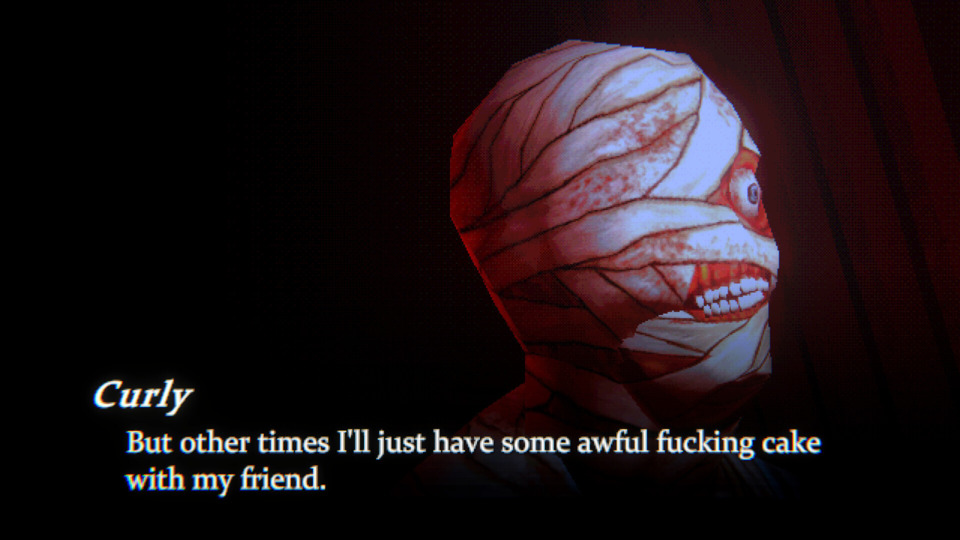
Will I buy the full game when it comes out?
Probably. Wrong Organ's last title, How Fish Is Made, is a delightfully surreal, disgusting, and depressive walking simulator that is the type of provocative art I can get behind. It also has a tongue-eating louse that does a musical number, which leads me to believe that the weirdness of Mouthwashing will be even better as the game has superior production values and far more creative ambition. In terms of PS1-inspired modern horror games, Signalis remains the high-water mark, and its first-person sequences still stand as one of the best surprises of 2022. Mouthwashing doesn't shirk away from its first-person perspective and doesn't quite make as many weird twists and turns as I would have liked in such a short demo. Most of your time after the game's incredible opening sequence involves you performing fetch quests and processing expository dialogue from the supporting characters. The time skips are thematically interesting, but the flashbacks give you little agency over your actions or responses. It's a shame the weirdness crank doesn't get turned earlier because things end just as you think the real Mouthwashing starts to peak its head.
Cyber Manhunt: New World
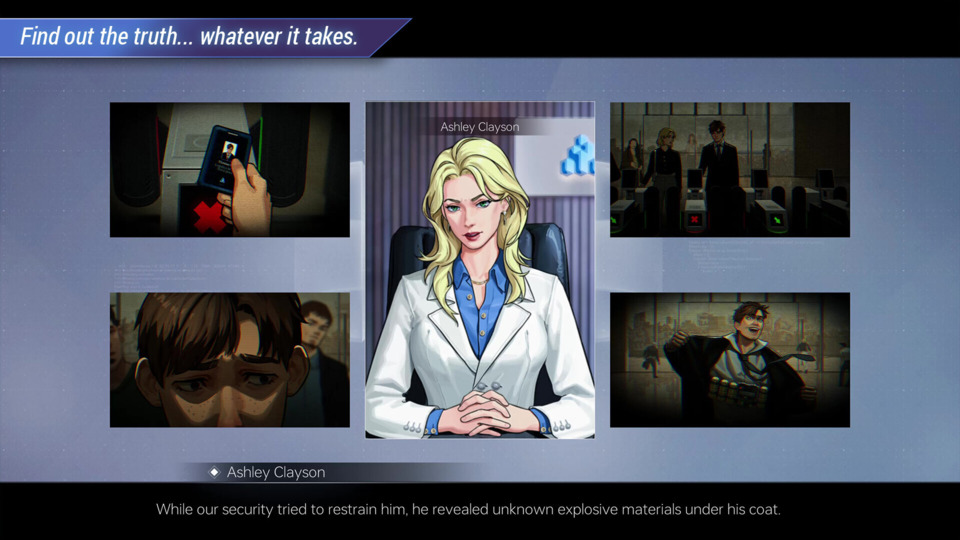
What is it?
Cyber Manhunt: New World is a new entry in the Cyber Manhunt franchise from developer Aluba Studio. These games are often called "hacking simulators" as they task you with fishing through fake digital portals and websites to find incriminating evidence on mission targets. By my metrics, it would be more accurate to call them "social engineering simulation games" as you spend most of your time gathering information about others through various fake social media venues and digital platforms. While other games of this type have you play from the perspective of a blank slate hacker, Cyber Manhunt: New World changes things up by having you play through the perspective of a generative chatbot algorithm that is slowly developing a personality but is incentivized to assist a megacorp's efforts to invade on the privacy of its employees to find out who has been leaking trade secrets to the press. That was A CHOICE!
What's in the demo?
The game is short and straightforward, and the demo provides you with what I assume is the final game's first hacking target. To collect clues on whether or not a person needs to be terminated from the company's workforce, you must use your mouse cursor to navigate a bunch of fake work emails, click on the proper nouns and the names of authors and recipients of those emails, and then use fake social media platforms and search engines in the game to investigate them further. There are a few minigames to spice things up, but the lion's share of your time involves scanning documents, photos, fake Facebook posts, and emails and clicking on the one or two things the game wants you to click on these pages to move forward in the story. Despite us all knowing and accepting that the internet and the World Wide Web have many dead ends and rabbit holes, the online world of Cyber Manhunt: New World is incredibly linear. However, when you uncover enough clues on a suspect, each mission culminates in a social deduction phase where you must assemble clues to form an evidence-based conclusion. Of all things, this part of the game is reminiscent of Contradiction: Spot The Liar. The clues you locate during the earlier phases of your investigation appear as sentence fragments, and you need to piece together these fragments to create whole and true declarations.
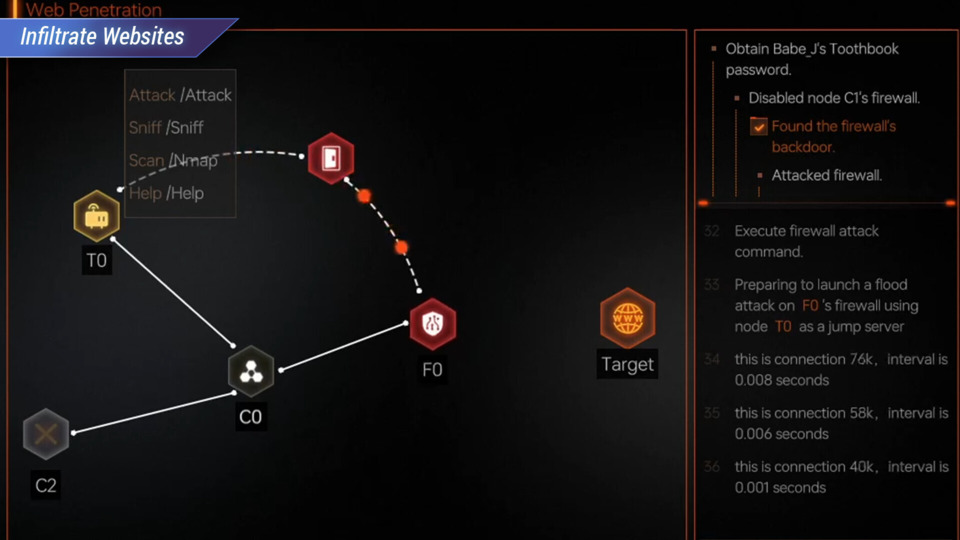
Will I buy the full game when it comes out?
HELL NO! I'm going to go ahead and say this might be the most morally repugnant game I played during this edition of Next Fest, and I made an effort to avoid the VR porn games this time! Playing a game as an artificial intelligence that is helping a corporation hack into the lives of its employees is gross. The developer might say this is the point, and they are using their game to discuss the possible uses of generative chatbots and large language models in the real world. Regrettably, the game's message is not entirely clear, and getting through the story isn't engaging. Almost everything you do involves clicking on the screen and seeing if you found the right tab or hyperlink to uncover a new page to turn to on the screen. It's not an incredibly interactive affair, which I wouldn't have minded as I am an interactive fiction and visual novel fan. However, the emails and social media posts are comically bad, so much so that I thought this was a parody game of what people think tech workers do for a living and how the corporate world operates.
Homeworld 3
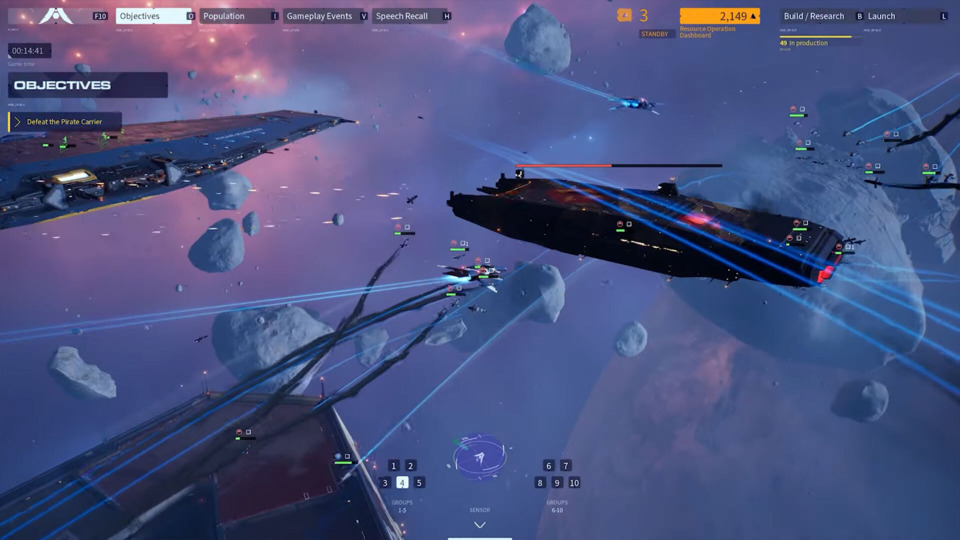
What is it?
It's the third Homeworld game, though, that seems unfair as Homeworld: Deserts of Kharak now feels like it has progressed beyond being a sales pitch or proof of concept for a modern revival of the series. Homeworld is a legendary space real-time strategy game series dating back to 1999 and was initially tied to developer Relic Entertainment. The franchise went dormant for over a decade until Gearbox bought its rights, quickly remastered the first two games, and published Homeworld: Deserts of Kharak in 2016 after contracting the game's rights to Blackbird Interactive. Since Deserts of Kharak, Gearbox has been teasing a proper sequel to Homeworld 2 for AGES, and in 2019, they finally provided fans with a teaser trailer at PAX. With the February 2024 Steam Next Fest, Gearbox shared the first playable version of the game to the public, which included a simple matchmaking multiplayer option and a handful of introductory campaign missions.
What's in the demo?
This demo is hard to assess. When I played the Homeworld 3 demo, the game looked great, especially when playing the campaign missions, and it showcased an incredibly in-depth tutorial system. The campaign missions played like a dream and captured the spirit of the first two games perfectly. Homeworld, at least to me, was all about visually epic space battles over genuine, in-depth 4X or RTS systems. While I'm not going to deny that you can get into its non-combat systems, Homeworld was about designing giant spaceships and having them engage in massive battles with Star Wars's sense of epic space opera pageantry. If you wanted in-depth space empire building, Masters of Orion was the series for you on PC. Homeworld 3's demo already showcases that Blackbird Interactive understands that completely, and the ship-building tools are also there to get long-time fans salivating.
The issue with the Homeworld 3 demo stems from its multiplayer, which was utterly nonfunctional for the entirety of Next Fest. On five separate days, I tried to use the demo's matchmaking and even turned off all filters that might have limited the number of online games I could be positioned into. Every time, I got an entirely different crash or hard lock. Sometimes, I would get stuck in the demo's online matchmaking load screen and stay there forever; other times, the game would crash after confirming I was entering a new online match. Half of the demo outright did not work, and Gearbox and Blackbird Interactive have been on damage control, with both confirming the game is delayed until May in large part due to its Next Fest struggles. More distressingly, shortly after the announced delay, Blackbird Interactive confirmed that it had laid off staff due to "economic pressures" outside of their control. Even if I accepted that the game's demo was a work-in-progress snapshot, the news surrounding Homeworld 3 clouds my impressions and dampens my ability to get excited about its official release.

Will I buy the full game when it comes out?
I'm a massive fan of the Homeworld series, with Homeworld 2 being a game clearly in my top ten "Most Played Games of All-Time" list. Nonetheless, the Next Fest demo relayed some cause for concern, so I will adopt a "wait and see" approach for now. The online multiplayer isn't crucial to my enjoyment as the game's grand campaign is likely where most of my time and attention will be located. Nonetheless, there is a preponderance of evidence to suggest that the game is not quite "there," and pre-ordering it would be a dicey proposition. I still think highly of Blackbird Interactive's previous work, which includes Deserts of Kharak and Hardspace: Shipbreaker. Homeworld 3 plays into their strengths, but knowing the studio has been beset with layoffs leaves me wondering if they have the time and warm bodies to fix a game that we know needs more time in the oven.
INDIKA
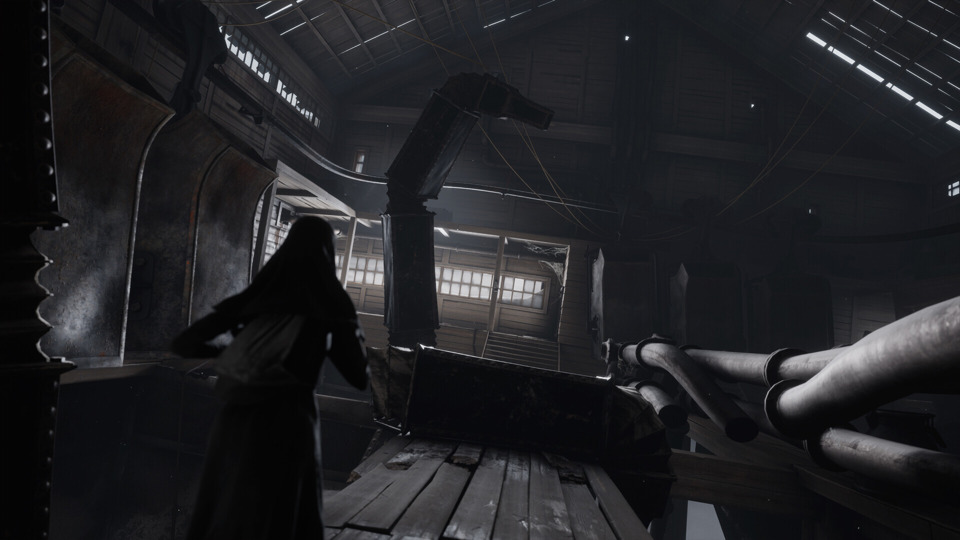
What is it?
Polish publisher 11 Bit Studios has undoubtedly come a long way since its founders, former devs from CD Projekt and Metropolis Software, debuted their first game, Anomaly: Warzone Earth, in 2011. In the thirteen years since their first title, they have become a point man for smaller Polish and Eastern European studios getting on to Steam and the Epic Game Store, with a growing emphasis on weird narrative-driven games. Indika, stylized as INDIKA, is another one of those weird narrative-driven games but from developer Odd Meter, whose last project was the VR-only archery combat game Sacralith: The Archer's Tale. Indika is an alternate history walking simulator set in a Steampunk-inspired version of Tsarist Russia. The main character is a nun who rescues a frostbitten soldier as they make their way to their empire's capital city. While making that trek in the demo, you complete a few puzzle sequences, with the highlights being when the protagonist begins talking to the Devil and when both she and her companion need to fend off a beastly rabid dog.
What's in the demo?
This game is a walking simulator with simple exploratory bits and puzzle-solving to mix things up. Most of these tasks involve finding an object that helps the main character or their companion eliminate barriers to their progress. While you navigate the environments, you can pick up trinkets to progress the game's morality system and tech tree. I'm still unclear about the implications of that system because it comes out of nowhere after you pick up random tat in the levels and chimes weird 8-bit retro video game stylings, which do not meld with the rest of the game AT ALL. With the demo not being a substantial vertical slice of what this game entails, the leveling system may make more sense when Indika is operating as a multi-act narrative. Still, picking between leveling up the player character's "sympathy" or "guilt" was silly when there's no payoff to this at any point in the demo. Then there's the puzzle sequence in which your nun combats the Devil, which is another moment that is tone-wise entirely antithetical to the game's starting atmosphere and premise. It plays out like an indie takes on Portal 2, with you needing to oscillate between your character's mental states to make platforms move from different placements to get past a previously insurmountable chasm. All the while, the game plays weirdly out-of-place SNES-inspired music.
If you haven't figured it out yet, this game is a mess, but I don't know if that is a bad thing. Indika is clearly building towards something, and expecting a demo from Next Fest to lay out all of the goods is unfair. Nonetheless, so much of the game is a tonal and mechanical mess. There's a bit in the demo where you need to make icebergs bob after running up and down on them so your character can leap over a metal gate. The issue is that this puzzle is entirely environmental, with zero signposting on what you need to do. And then there are other bits, like when you use a ladder to enter an abandoned shed or the platforming sequence with the Devil, where the game tells you precisely what you need to do and what's happening on your screen. And some sequences are way too trial-and-error based. The demo ends with a chase sequence involving a horrible dog monster, and it is not fun. You have to avoid it by following a particular set of steps and movements within a perilous time limit, and if you mess up even slightly, you have to start from the beginning.

Will I buy the full game when it comes out?
Despite a relatively long hiatus, I am the site's resident puzzle-solving sicko, and I do have a penchant for playing messy Eastern European games. If priced at a reasonable rate, I might check out Indika before the end of the year, but I'm not holding out hope that the game significantly improves from what I played in the demo. This game will be released as a weird mishmash of conflicting themes and gameplay structures. The funnier debate is whether this or The Thaumaturge, another 11 Bit Studios published work, will be my "Tsarist-Approved Eurojank Game of 2024." Being a roleplaying game means that The Thaumaturge will likely be the more in-depth option, but Indika seems like it's trying to be more art-house and experimental with its odd mixture of themes and mechanics. So, who's to say?! I'll probably play this game and report on how things finally shaped up because I want to see how wild and messy this ride becomes.
Mullet Mad Jack

What is it?
Mullet Mad Jack, stylized in all caps as "MULLET MAD JACK," is a first-person combat run-based game with a card-based roguelike inventory system. It is also an unfiltered take on 90s-era anime mixed with modern gaming jargon and slang. At the start, the game presents a premise where a female hostage is being kept at the top of a futuristic skyscraper by a robotic billionaire, and your mullet-clad police officer protagonist has to get to the top to save her. However, for "reasons," you only have ten seconds to clear every level of the tower, or else the hostage dies, which erases your current equipment and sends you back to the base of the building you are currently on. There are ways for you to increase and reset your timer, and at the end of every level, you can assess a randomized assortment of weapons and equipment that may or may not assist you in getting past your foes in the upcoming level. The best way to summarize Mullet Mad Jack is to describe it as a weird middle ground between the fast, run-based gameplay of Neon White and the visceral neon-drenched violent sensibilities of Hotline Miami.
What's in the demo?
The demo provides an early build of equipment and buffs, which the developer continues to expand upon, and an infinitely resetting set of towers. Like another game that took off during Next Fest, Balatro, the demo provides enough tools to get the conceit of its combat and determine which build paths you want to prioritize. As the end-of-level vending machines are randomized, you can't hold out for identical builds or strategies. Nevertheless, you can figure out the game's basics, like if you want to specialize your characters for melee or gun-based builds. Similar to Neon White and Hotline Miami, there's an almost rhythm game-like sense to Mullet Mad Jack, where you can get a feel for levels based on the placement of enemies. However, is it appropriate for Mullet Mad Jack to include roguelike hard resetting? For Neon White and Hotline Miami, you can reset the level and try something different when you meet an untimely demise after testing a new strategy. With Mullet Mad Jack, failure resets everything, and that's a bit brutal. For example, after comfortably blasting past enemies with a pistol and eventually a submachine gun, I decided to give the katana and melee weapons a shot and almost immediately discovered that they were not my cup of tea. Unfortunately, I had to quickly scramble to the end of the level so I would not lose my progress and had to pray the next vending machine would spawn my previously favored weapons, which it did not.
Also, this game's tone and style will rub some people the wrong way, which is immediately apparent when you start your first run. The premise on why you need to beat levels within ten seconds stems from your character being a cop for hire that needs to placate social media netizens who are watching their robotic murder spree on the internet. The game, especially its edgy female narrator, leans into 90s internet and anime culture, and that might be too much for some of you reading this blog. While I enjoyed it at times, it's going to make those of you that dislike schlocky anime horseshit and games using gaming terms in an edgy manner want to eat out your eyeballs. Likewise, your screen becomes incomprehensible within seconds, and if you have a sensitivity for flashing lights or loud overlapping audio, there is no version of this game you can play. This game deliberately sets out to provide a video game experience with a neon-based dopamine rush and makes no apologies. There's so much shit on your screen any given second that I can only ever imagine playing this game in short thirty-minute to one-hour sessions at most.
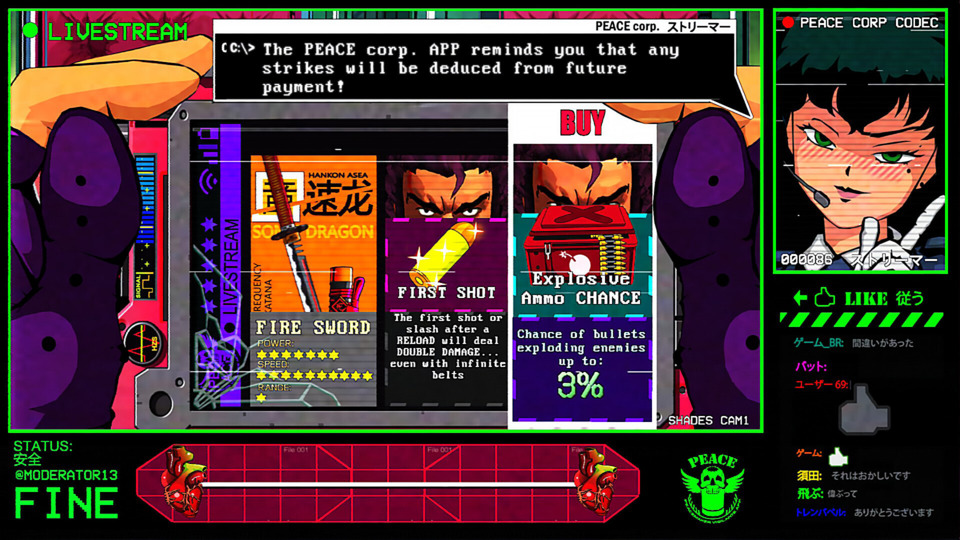
Will I buy the full game when it comes out?
I enjoyed my time with Mullet Mad Jack, but I'm a homer for schlocky anime parodies and run-based games. Even then, this game is way too overwhelming with its sensory overload for me to recommend it without caveats. It is a visual tour de force, but it might be too much for some of you to take in, and I want to respect that. Also, are its roguelike trappings to its benefit? With each level so fleeting and having a punishing fail condition, you can't strategize and consider alternate options in any given seeding as freely as you'd like. Without even a single "Do Over," you can genuinely screw yourself over and have to start from scratch, which is never a great feeling. Even if you enjoy the experiential elements of roguelikes, something about this game feels "mean." Furthermore, it will be interesting to see how the game attempts to sustain itself, as when I completed the first tower, I did start to feel like I was getting my fill with the types of weapons and encounters the game was providing. I'll keep my eye out for how this game shapes up, as that's what your Steam Wishlist is for, but I'm still skeptical.
Balatro
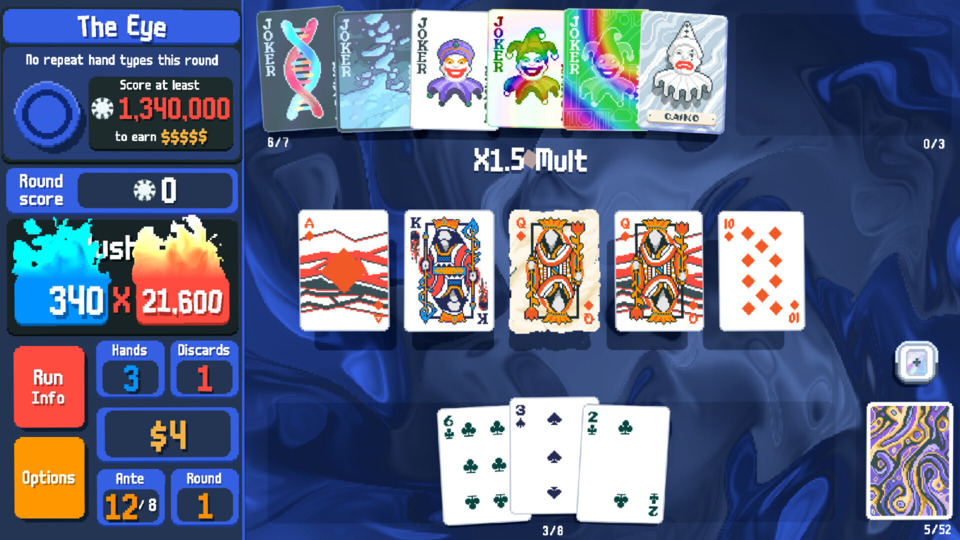
What is it?
It's the viral sensation of February 2024's Steam Next Fest!Balatro is a poker roguelike with a variety of ways in which you can modify your standard deck of playing cards. The game's scoring system is also a mix of traditional poker and Yahtzee. You need to create a suit or assortment of Poker-based hands but can re-deal cards that you don't want a limited number of times in hopes of getting more points. Your score is determined by the value of cards in the hand you played, depending on their rank. Your score is also influenced by a multiplier, which depends on your non-deck buffs, which usually come from Joker cards, and the card modifications in your hand. The Joker cards, buffs, and deck improvements are unlocked at a shop you can access at the end of a successful round. Some cards will modify your core playing deck, and you can also buff individual cards. Every three rounds, a boss encounter limits what you can do or how you can typically accrue points to meet the game's blinds for every round.
What's in the demo?
The demo provides an assortment of Joker cards and boss blind types that have since grown with the game's official release. Likewise, the demo caps out at five levels. Nonetheless, this demo provides a spectacular exhibition of what this game is like and if its gameplay is your kind of card-base tomfoolery. Despite the simplicity of its premise, Balatro has a surprising amount of depth. Your gut reaction at the start might be to always look for the highest possible poker hand you can assemble, but with the planet cards that increase the levels of your possible playing hands, you can invert those expectations. There were ways for me to wrack up thousands of points, simply by playing hands with one high card and other times when a three-of-a-kind drew a higher score than a four-of-a-kind or flush. The Joker cards are also a trip with some completely changing how you approach seeds or rounds. Sometimes, you play nothing but flushes or straights, as you have Joker-based or Celestial card buffs where that's your strategy. Other times, you might care less about your type of hand and instead worry about buying Tarot cards or more Jokers to boost your hand multiplier.
If there is one cause for concern with the demo, it is that it is slightly unbalanced and cuts out some of the final game's dynamism. The full version of the game has retooled the cost of certain card types and vouchers, which is greatly appreciated. Likewise, the deck types you can use in the demo could have done a better job of highlighting how much of an impact that mechanic has on your starting strategies. I almost wish one of the wackier starting decks were included in the demo so more people understood how crazy this game can get. Another shortcoming of the demo stems from it showcasing some of the more annoying boss blinds. Nonetheless, the game does a lot with a little. The CRT-like filter and simple fire effect that plays when you submit a high score dealing hand go a long way in making your brain receptors happy. Furthermore, even when you lose, you can copy and paste the seed you lost against to try things again but attempt a different approach. That leads me to suspect that Balatro is a bit like FreeCell, wherein every hand has at least one possible victory condition; it is just a matter of you playing the right cards at the right time with the appropriate buffs.
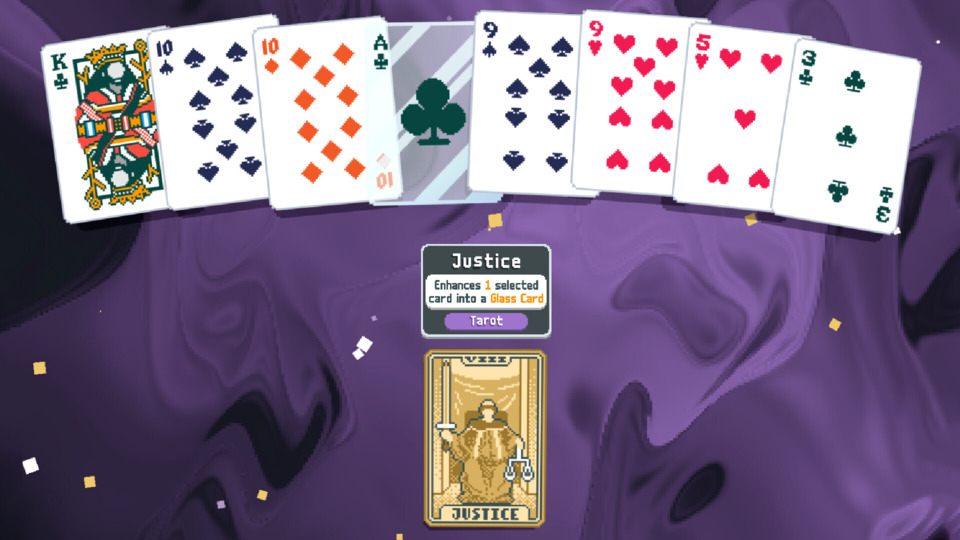
Will I buy the full game when it comes out?
I ALREADY HAVE! Balatro is heroin. It is a card-based game that taps all of the synapses on the lizard portions of my brain. Balatro is very dangerous. The final version of the game has even more playstyles and decks for you to try out and daily seeded challenges reminiscent of Spelunky. There's so much in Balatro to keep you coming back; even when you lose, you often have at least something to show for your efforts. Whether trying out new Joker cards you've never played before or rolling the dice on Spectral Cards, which can fundamentally change your deck, even when you repeat seeds, there are plenty of ways to make each run a unique experience. I'm not a big fan of digital card games, but I love Balatro. After you've spent hours on something significant, it's a great palette cleanser game, but there's enough meat on its bones to play it as a standalone game. Despite the demo becoming a bit "dated" with the release of the completed game, it's still worth a shot to figure out if the Balatro rush works for you.
Log in to comment